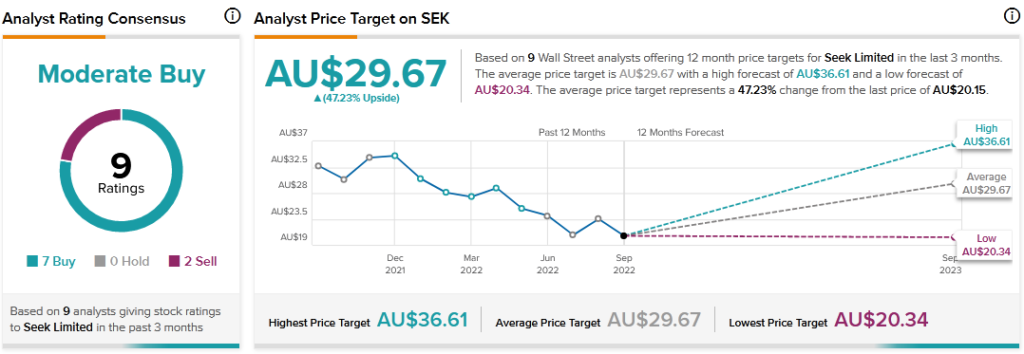SEEK (ASX:SEK) shares have dropped sharply in 2022, but analysts remain bullish on the stock.
Confident Investing Starts Here:
- Easily unpack a company's performance with TipRanks' new KPI Data for smart investment decisions
- Receive undervalued, market resilient stocks straight to you inbox with TipRanks' Smart Value Newsletter
Melbourne headquartered SEEK operates a online jobs marketplace, connecting jobseekers employers. SEEK operates in a dozen countries, including New Zealand, Singapore, Indonesia, and Mexico.
The company has a variety of revenue sources. Apart from offering job ads, it also makes money from job training and higher education courses. SEEK’s business is profitable and the company recently boosted its final dividend for fiscal year 2022. It expects its earnings to improve in fiscal 2023.
SEEK shares drop despite upbeat outlook
Despite Seek’s mostly bullish outlook, the stock has declined about 40% year-to-date. The pullback in the stock may be a result of concerns that a recession could damage SEEK’s business. A recession is usually characterised by job losses or a slowdown in hiring, which could impact SEEK’s earnings.
SEEK’s stock price prediction
Analysts continue to believe that SEEK stock is a good investment despite its steep decline. According to TipRanks’ analyst rating consensus, the stock is a Moderate Buy based on seven Buys and two Sells. The average SEEK stock price prediction of $29.67 implies over 47% upside potential.

SEEK stock scores a nine of 10 from TipRanks’ Smart Score rating system, indicating that the stock has strong potential to outperform market expectations.
Moreover, SEEK is seeing favourable mentions on financial blogs. TipRanks data shows that financial blogger opinions are 100% Bullish on SEK stock, compared to a sector average of 64%.

Final thoughts
SEEK shares may still fall as a result of recession concerns. However, given its recent declines, negative sentiment based on a potential recession is now likely to have been priced into the stock.










